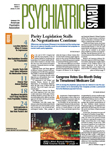While psychiatric diagnosis can be essential to proper treatment, overt discussion of diagnosis with some patients with serious mental illness can actually be a stumbling block to their recovery, according to a study in the January American Journal of Psychiatry.
With the help of five graduate student interviewers, author Tanya Luhrmann, Ph.D., spent more than 1,000 hours over three years interviewing 61 women who frequented a drop-in center in Chicago that offered non-clinical services such as laundry, mail, a daily meal, and access to a caseworker.
Though Luhrmann, a professor of anthropology at Stanford University, did not conduct formal diagnostic interviews, she noted that 55 percent reported a prior psychiatric hospitalization, and 55 percent reported at least one arrest. Only 28 percent of those she interviewed volunteered a diagnosis of schizophrenia or bipolar disorder.
Luhrmann noted that when women refused services such as housing, they did so because they did not perceive themselves as “crazy,” despite wanting and needing a place to stay. Luhrmann explained that it was common knowledge among the women that a person needed a psychiatric diagnosis to obtain a single-occupancy room in the area.
Most of the women Luhrmann interviewed said they believed that the uncertainty and danger of life on the streets drove some “crazy,” and they believed that only those who were weak-willed succumbed to the harsh reality of life on the streets by becoming, for instance, psychotic, she told Psychiatric News.
“The women I interviewed, who themselves could be diagnosed with some kind of psychotic disorder, were motivated to say that they were not going to be driven crazy by life on the streets” and emphasized that they have a better chance of surviving by not seeking mental health services or social services that require a psychiatric diagnosis.
Some of the women at the center linked victimization with mental illness because the perception by others that they are mentally ill makes them vulnerable to attack, Luhrmann noted.
One woman Luhrmann interviewed mentioned that some of the women “talk to themselves. .because they let the streets take over them. .a lot of the women have been raped by the men here and. .can't deal with it, so that just made them go haywire.”
That the women for the most part endorsed a view of mental illness as linked to weakness and being defeated is stigmatizing, in Luhrmann's view, but“ it is more important to understand that it arises out of a social world they experience as an assault that they have to survive,” she noted.
In addition, many social-service settings have strict rules regarding social conduct, which may conflict with homeless women's “need to be tough” to survive on the street. As a result, many homeless women are barred from social-service or mental-health programs with stringent behavioral codes, Luhrmann noted.
Understanding the reasons why homeless women with serious mental illness refuse social services, such as housing, as a “meaningful social signal” rather than a lack of insight should lead service providers to take a different approach to the way they offer services.
In interactions with homeless women who have a psychotic disorder,“ every effort should be made to avoid presenting the patient with an explicit psychiatric diagnosis,” Luhrmann noted.
Instead, clinicians and administrators should construct interventions that are more sensitive to these women's social context, she said, and that don't explicitly label the women with a psychiatric diagnosis because it is perceived as a “sign of great vulnerability to predatory others.”
At present, many supported housing programs for individuals with psychiatric disabilities require clients to be assessed and diagnosed and to agree to participate in psychiatric treatment and sometimes substance abuse treatment.
“Not requiring that clients go off to a psychiatrist [to get a psychiatric diagnosis] is one way of minimizing refusal of services,” Luhrmann suggested.
According to Jeffrey Stovall, M.D., chair of APA's Corresponding Committee on Poverty, Homelessness, and Psychiatric Disorders, Luhrmann provides“ important social and cultural insight that declining to accept housing may not be a sign of poor insight, but may rather be an individual's attempt to avoid stigmatization and institutionalization.”
Stovall suggested that psychiatrists advocate for patients' access to permanent housing that is provided within treatment programs and also for the“ housing first” approach, which does not require sobriety, makes minimal demands on client compliance, and minimizes psychiatric evaluation and diagnosis.
Luhrmann's article should “encourage us to advocate for the availability of flexible and engaging psychiatric services provided outside of traditional clinical settings, particularly those services integrated into other social and clinical services that are provided to people who are homeless.”
